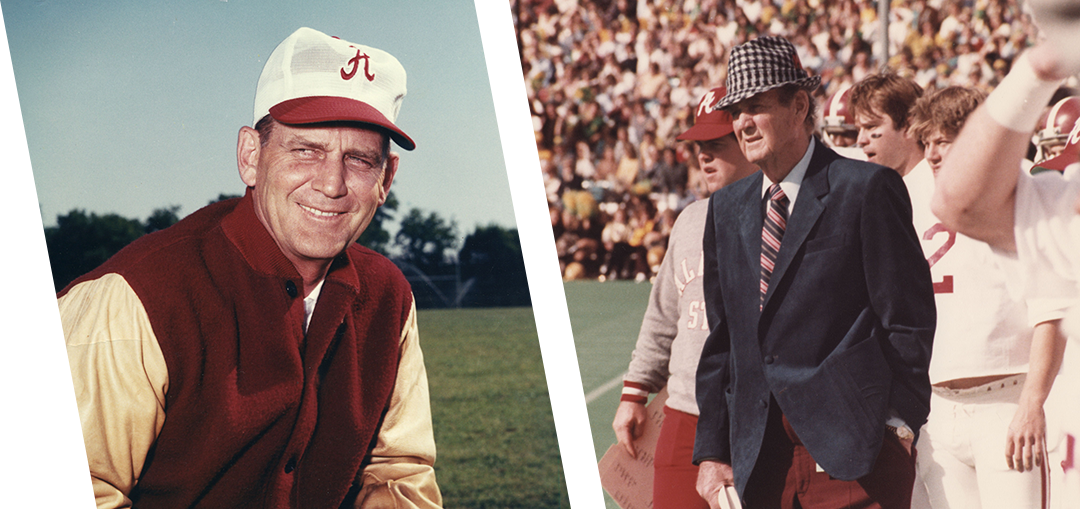Paul “Bear” Bryant Biography & History
Coach Paul “Bear” Bryant – his name conjures images of a man in a houndstooth hat standing by the goal post, coaching his team to yet another victory. Years of experience were etched in his gentle face, but behind the grandfatherly exterior lay what could be described as the right stuff, the stuff that created a legend. He had a reputation as a homespun authoritarian and a tough, but loved, taskmaster.
Paul William “Bear” Bryant’s journey through life transcended the confines of a football field, leaving an indelible mark on the sport and the countless lives he touched.
Early Life
Born on September 11, 1913, in Moro Bottom, Arkansas, Bear Bryant’s upbringing laid the foundation for his later success. His roots in a farming community instilled in him the values of hard work, perseverance, and resilience – qualities that would shape his coaching style. Displaying an early passion for football, he played for the Fordyce High School Redbugs and later the University of Alabama Crimson Tide.


College Football Playing Career
Bryant’s passion for the sport led him to the University of Alabama, where he played as a varsity end from 1933 to 1935. Under the guidance of head coach Frank Thomas, Bryant honed his skills and gained insights that would later influence his coaching style. His playing days provided invaluable insights into the dynamics of the game, setting the stage for his future success.
Coaching Career
Paul William “Bear” Bryant’s coaching career left an indelible mark on college football, spanning several decades and encompassing unparalleled success. His journey through different coaching roles showcases his strategic brilliance, leadership prowess, and commitment to excellence both on and off the field.
University of Maryland Terrapins
In 1945, Bryant embarked on his coaching journey by joining the University of Maryland as an assistant coach. The following year, he continued in his role as an assistant under head coach Jim Tatum. Although his time at Maryland was brief, it marked the initial steps of a career that would shape the landscape of college football.
University of Kentucky Wildcats
Bryant’s coaching journey took a significant turn in 1946 when he was appointed as the head coach of the University of Kentucky Wildcats. In his inaugural season, he guided the Wildcats to a 5-3-2 record, setting the stage for his impact on the team. The subsequent years were marked by notable achievements, including leading the Wildcats to an 8-3 record and an Orange Bowl victory in 1949. Bryant’s coaching brilliance shone through in 1950 when he achieved an impressive 11-1 record and secured a Sugar Bowl victory. His time with the Wildcats culminated in 1953, leaving a legacy of success and strategic acumen.
Texas A&M Aggies
In 1954, Bryant took on the role of head coach for the Texas A&M Aggies, further cementing his reputation as a coaching luminary. Under his leadership, the Aggies experienced remarkable achievements, including a stellar 9-0-1 record and a Gator Bowl victory in 1956. The following year, Bryant continued to make his mark with an 8-3 record and a Tangerine Bowl appearance, leaving a lasting legacy at Texas A&M. From 1954-58, he produced a Southwest Conference championship team and his lone Heisman winner, John David Crow. Bryant then returned to the University of Alabama for good, saying “…when Mama calls, then you just have to come running.”
University of Alabama Crimson Tide
Bryant’s arrival at the University of Alabama as a head coach in 1958 marked a turning point in the school’s football history. Over the next 25 years, he guided the Crimson Tide to a triumphant era, redefining the standards of excellence. Under his leadership, the team secured an impressive six national championships, cementing his status as an icon in college football coaching. Bryant’s influence extended beyond the field, as he emphasized discipline, teamwork, and character development. His unique blend of strategic brilliance and motivational mastery propelled his teams to victory and his players to greatness.
The mentor who turned the Crimson Tide around, he was named the NCAA’s Coach of the 1960s. His teams toured the bowl circuit : Orange, Cotton, Sugar, Gator, Liberty, Bluebonnet – 24 in all. When he retired, Bryant had won more games than any other coach in college football history (323). In 25 years, he coached Alabama to 25 winning seasons, 24 bowl games, and six national championships. Bryant inspired those under him through hard work, high standards, and quality of character. He was the best kind of leader; he turned individuals into teammates.
A mere 28 days after his final victory in the Liberty Bowl and retirement, Bryant died of a heart attack in Tuscaloosa, Alabama on Jan. 26, 1983 at the age of 69.
Other Coaching Roles and Achievements
Bryant’s influence extended beyond his formal coaching roles. He was selected to coach the College All-Star Game in both 1962 and 1963, showcasing his ability to lead a diverse group of athletes. His exceptional contributions to the sport were acknowledged in 1983 when he was inducted into the College Football Hall of Fame. Sadly, Bryant passed away on January 26, 1986, leaving behind a legacy that continues to inspire coaches, players, and fans alike.
Championships and Achievements
Bryant’s legacy is punctuated by an extraordinary list of achievements. His six national championships (1961, 1964, 1965, 1973, 1978, 1979) stand as a testament to his strategic prowess and ability to shape winning teams. His 323 career victories garnered numerous accolades, and he remains one of the winningest coaches in college football history.
Leadership and Legacy
Beyond his impressive record, Bryant’s legacy lies in the lives he touched and the principles he imparted. His leadership philosophy was rooted in the belief that a coach’s role extended beyond the game – it was about molding young men into responsible citizens and future leaders. Known for his stern exterior and deep respect for discipline, Bryant cared deeply for his players’ personal growth, often offering guidance that extended far beyond football.
Honors and Recognition
Bryant’s impact was recognized during his lifetime, with inductions into the College Football Hall of Fame and the Alabama Sports Hall of Fame. His commitment to excellence earned him the title of the “Coach of the Century” by the American Sportscasters Association. These accolades bear testament to the profound influence he had on the sport and its culture.
Personal Life
Beyond the football field, Paul “Bear” Bryant was a husband and father who valued family. He shared a deep bond with his wife, Mary Harmon, and his children. His personal journey revealed a multi-dimensional character – one driven by a relentless pursuit of excellence in all aspects of life.
About the Awards
Bear Bryant’s legacy reverberates through the principles he instilled in his players and the way he shaped the landscape of college football. His legacy lives on through the countless athletes, coaches, and fans who continue to draw inspiration from his enduring example of leadership and character.
As we delve into the rich history of Paul “Bear” Bryant, we invite you to explore our website and learn more about his remarkable journey. The Paul “Bear” Bryant Coach of the Year Award stands as a beacon, celebrating coaches who embody his legacy and principles of excellence. Join us in honoring the man who left an indelible mark on college football and beyond.
Why The Awards Were Created
While the Coach of the Year Award has been an annual tradition since 1957, The Bryant Family felt moved to educate and impact awareness around heart disease and stroke following “Bear’s” passing. The family approached the American Heart Association to create a meaningful partnership to keep “Bear’s” legacy alive while raising funds to support research.
